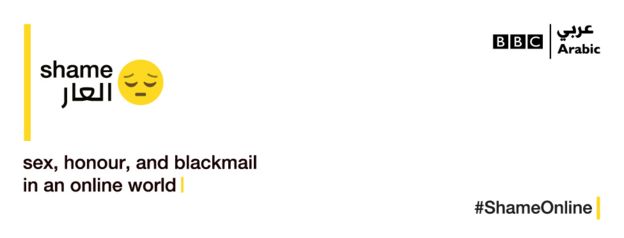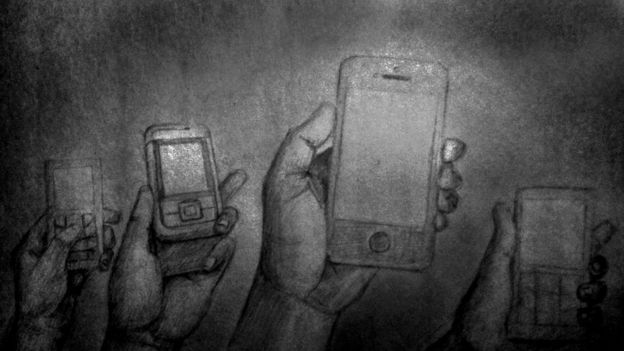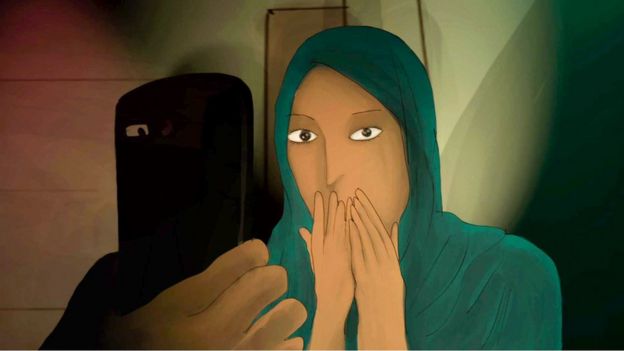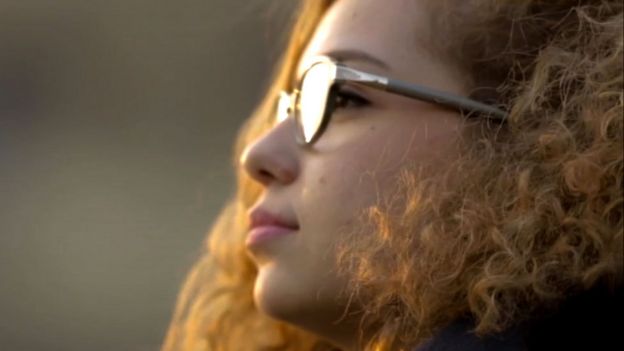Source: BBC
A BBC investigation has found that thousands of young women in
conservative societies across North Africa, the Middle East, and South
Asia are being shamed or blackmailed with private and sometimes sexually
explicit images.
Daniel Silas Adamson looks at how smartphones and social media are
colliding head-on with traditional notions of honour and shame.
In 2009 an 18-year-old Egyptian girl, Ghadeer Ahmed, sent a video
clip to her boyfriend's phone. The clip showed Ghadeer dancing at the
house of a female friend. There was nothing pornographic about it, but
she was wearing a revealing dress and dancing without any inhibition.
Three years later, in an act of revenge after their relationship had
ended, the boyfriend posted the video to YouTube. Ghadeer panicked. She
knew that the whole situation - the dance, the dress, the boyfriend -
would be utterly unacceptable to her parents, to their neighbours, and
to a society in which women were required to cover their bodies and
behave with modesty.
But in the years since she had sent the video, Ghadeer had also taken
part in the Egyptian revolution, taken off her hijab, and started to
speak out about the rights of women. Outraged that a man had attempted
to publicly shame her, she took legal action. Although she succeeded in
having him convicted for defamation, the video remained on YouTube - and
Ghadeer found herself attacked on social media by men who sought to
discredit her by posting links to it.
In the West a naked picture might only humiliate a girl - but in our society it might lead to her death
Inam al-Asha, Jordanian psychologist and women's rights activist
In 2014, sick of the abuse and tired of worrying about who might see
the film, Ghadeer made a brave decision: she posted the video on her own
Facebook page. In an accompanying comment, she argued that it was time
to stop using women's bodies to shame and silence them. Watch the video,
she said. I'm a good dancer. I have no reason to feel ashamed.
Ghadeer is more outspoken than most Arab women, but her situation is
not unusual. A BBC investigation has found that thousands of young
people - mainly girls and women - are being threatened, blackmailed, or
shamed with digital images from the innocently flirtatious to the
sexually explicit. Obtained by men - sometimes with consent, sometimes
through sexual assault - these images are being used to extort money, to
coerce women into sending more explicit images, or to force them to
submit to sexual abuse.
Revenge porn is a problem in every country on Earth, but the potency
of sexual images as weapons of intimidation stems from their capacity to
inflict shame on women - and in some societies, shame is a much more
serious matter.
"In the West, it's a different culture," says Inam al-Asha, a
psychologist and women's rights activist in Amman, Jordan. "A naked
picture might only humiliate a girl. But in our society, a naked picture
might lead to her death. And even if her life isn't finished
physically, it is finished socially and professionally. People stop
associating with her and she ends up ostracised and isolated."
#ShameOnline

This is one of a series of stories looking at a new and disturbing
phenomenon - the use of private or sexually explicit images to threaten,
blackmail and shame young people, mainly girls and women, in some of
the world's most conservative societies.
Most cases of this form of abuse go unreported because the same
forces that make women vulnerable also ensure they remain silent. But
lawyers, police, and activists in a dozen countries have told the BBC
that the arrival of smartphones and social media has sparked a hidden
epidemic of online blackmail and shaming.
Zahra Sharabati, a Jordanian lawyer, told the BBC that in the last
two or three years she has handled at least 50 cases involving the use
of digital images or social media to threaten or shame women. "But in
the whole of Jordan," she says, "I think the number is far higher - not
fewer than 1,000 cases involving social media. More than one girl, I
think, was killed as a result of this issue."
My guesstimate is going to be that we are seeing thousands of such cases [in India] on a daily basis
Pavan Duggal, Indian lawyer
Louay Zreiqat, a police officer in the West Bank, says that last year
the Palestinian police cybercrime unit handled 502 online crimes, many
of which involved private pictures of women. His compatriot Kamal
Mahmoud, who runs an anti-extortion website, says he receives more than
1,000 requests for help every year from women across the Arab world.
"Sometimes the photos are not sexual… a photo of a girl not wearing a
hijab could be scandalous. A man could use this photo to pressure the
girl to send more photos," he says. "The Gulf countries are facing
blackmail on a huge scale, especially girls in Saudi Arabia, the UAE,
Kuwait, Qatar, and Bahrain. Some girls tell us, 'If these photos are
made public, I will be in real danger.'"
In Saudi Arabia, the problem is so serious that the religious police
have set up a special unit to pursue blackmailers and to help women who
are being threatened. In 2014 the then head of the religious police, Dr
Abdul Latif al-Sheikh, told a Saudi newspaper, "We receive hundreds of
calls every day from women who are being blackmailed."
Further east, Pavan Duggal, a lawyer with India's Supreme Court,
talks of a "torrent" of cases involving digital images of women. "My
guesstimate is going to be that we are seeing thousands of such cases
[in India] on a daily basis," he says.
And in Pakistan, Nighat Dad, head of an NGO dedicated to making the
online world safer for women, says "two or three girls or women every
day" - about 900 per year - contact her organisation because they are
being threatened.
"When women are in a relationship they share their pictures or
videos," she says. "And if the relationship ends, not on a good note,
the other party misuses the data and blackmails them - not only to
remain in the relationship but to do all sorts of other weird stuff."

But it goes beyond blackmail. Nighat Dad is also starting to see a disturbing link between smartphones and sexual violence.
"It started from intimate pictures, but now it has a very grave
connection with rape itself," she says. Before these technologies, when
perpetrators used to do rape they had no idea how to silence the woman…
But now technology brings another aspect to the whole rape culture, and
it's to silence women by making a video and then to threaten that if
they speak out, this video will be shared online."
The more devastating the consequences of public exposure, the more power the perpetrator has over the victim.
One young woman from rural Tunisia told the BBC her story from a women's prison on
the country's north coast. It began when she was sexually assaulted and
photographed naked by a friend of her father. The images left her at
the mercy of her abuser, who subjected her to months of sexual violence,
while also blackmailing her for money. It was not until the man
threatened to rape her younger sister that Amal reached her limit. She
invited him to her house and murdered him with a meat cleaver. She is
now serving a 25-year prison sentence.

Another young woman, the 16-year-old victim of a gang rape in
Morocco, set herself on fire in July this year, after her rapists
threatened to share images of the attack online. The eight accused were
trying to intimidate the girl's family into dropping the charges against
them but instead drove her to suicide, as she suffered third-degree
burns and died in hospital.
It is in India and Pakistan, however, that the use of mobile phones to record sexual assault appears to be most widespread.
In August 2016, the Times of India found that hundreds - perhaps
thousands - of video clips of rape were being sold in shops across the
northern state of Uttar Pradesh every day. One shopkeeper in Agra told
the newspaper: "Porn is passé. These real-life crimes are the rage."
Another, according to the same report, was overheard telling customers
that they might even know the girl in the "latest, hottest" video.
In one example investigated by the BBC, a 40-year-old health worker
took her own life after a video of her being raped by a gang was
circulated in her village via the messaging service WhatsApp. The woman
appealed to village elders for help but, according to a colleague,
received no support from a society which saw her as not only sullied by
the attack, but even to blame for it.
But the power of these images in conservative societies can cut both ways.
Some women have understood that if they can be used as weapons to
shame women, then they may also be used as weapons to attack or
challenge patriarchal cultures.
When Ghadeer Ahmed posted the dancing video on Facebook she was not
just undermining attempts to humiliate her, but rejecting the very idea
that the video was a source of shame.
I refuse to be shamed for having a female body

"Yesterday a group of men tried to shame me by sharing a private
video of me dancing with friends. I am writing this to announce that,
yes, it was me in the video, and no, I am not ashamed of my body."
Read Ghadeer's story in full
In 2011, another young woman from North Africa, Amina Sboui, went even further: she posted a topless photo of herself on
Facebook. Across her naked torso she had written, "My body belongs to
me - it is not the source of anyone's honour." The image ignited a
firestorm of controversy in Tunisia.
More recently Qandeel Baloch, who came from a village in Pakistan's
Punjab region, used social media to gain celebrity by posting
provocative selfies online. Known as the Kim Kardashian of Pakistan, she
challenged Pakistani social norms by embracing the sexualised culture
of the internet - until she was strangled by her brother in July this
year for bringing shame on the family.
The power of smartphones and social media appears not to have been
lost on the authorities in Saudi Arabia, who, as well as aggressively
pursuing men who misuse images of women, run campaigns to educate girls
about the dangers of sharing photos online. On one level this is an
important measure to protect Saudi women, but the urgency of the
response may also reflect a recognition that technology has the power to
change patterns of behaviour and ways of thinking - and that it is
already opening up a new front in the battle over what women can and
cannot do with their bodies.
This is the first in a series of BBC reports looking at how new
technology has collided with age-old notions about honour and shame
across North Africa, the Middle East, and South Asia.
 Mr. Tarfa’s firm demanded, as legal fee, the sum of N5 million, which was paid in two equal installments of N2.5million. The first installment was paid in cash to the cashier at Mr. Tarfa’s firm, while the other was paid into Rickey Tarfa and Company’s account domiciled in Zenith Bank.
Mr. Tarfa’s firm demanded, as legal fee, the sum of N5 million, which was paid in two equal installments of N2.5million. The first installment was paid in cash to the cashier at Mr. Tarfa’s firm, while the other was paid into Rickey Tarfa and Company’s account domiciled in Zenith Bank.




